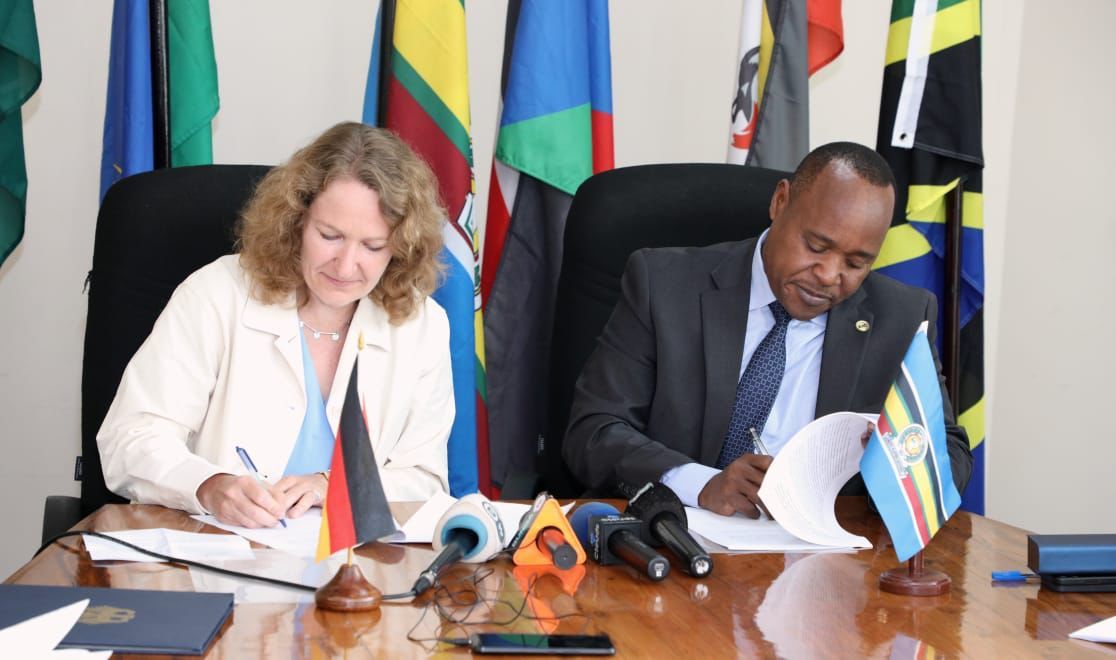The East African Community (EAC) and the Federal Republic of Germany have today reaffirmed their long-standing cooperation. EAC Secretary General Hon (Dr.) Peter Mathuki and the Head of the German Delegation, Ms. Claudia Imwolde-Kraemer from the German Federal Ministry for Economic Cooperation and Development signed the summary record of the negotiations, following a one-day EAC-German Government meeting on priorities for the development cooperation in the upcoming years, held at the EAC Secretariat headquarters in Arusha, Tanzania.
As a result of the successful negotiations, the Federal Republic of Germany has committed 29 million euros for extending the existing cooperation in the areas of education and training and conserving nature and natural resources, in particular water.
The EAC Scholarship Programme, financed through KfW, the German Development Bank, will be replenished by 4 million euros. The exchange programme is implemented through the East African Interuniversity Council (IUCEA). Scholarships are for economically disadvantaged students pursuing a Master’s degree in another EAC country. The additional funding will provide more students the opportunity to study abroad, and thus foster academic and cultural exchange, and provide meaningful education opportunities to skilled students from across the whole region.
The project “Digital Skills for an Innovative East African Industry” (dSkills@EA), implemented by the Deutsche Gesellschaft für Internationale Zusammenarbeit (GIZ) together with IUCEA and the Nelson Mandela African Institution of Science and Technology will be topped up by 2.5 million Euros. The funds will be utilised to strengthen the industry-academia collaboration, trainings and entrepreneurship support for students and graduates across the EAC. Increased digital skills for East African youth and stronger linkages between universities and businesses will lead to higher youth employment while also addressing the rising demand of businesses for digitally skilled workers.
The ongoing project “Integrated Water Resource Management in the Lake Victoria Basin” with the Lake Victoria Basin Commission (LVBC), financed through KfW, will be extended by by 20 million Euros. It aims at improving water quality and availability through the sustainable management of the Lake Victoria Basin by the Lake Victoria Basin Commission. Moreover, it will directly contribute to the improvement of water quality of the Lake Victoria by the implementation of High Priority Investments in the Partner States in the basin, reducing the disposal of untreated wastewater into Lake Victoria and its tributary rivers. Lake Victoria is the second largest freshwater body in the world. It is considered one of the most important shared natural resources of the East African Community (EAC), which has declared the lake and surrounding basin a regional economic growth zone.
The project “Support to the Lake Victoria Basin Commission” implemented by GIZ together with LVBC and the EAC Secretariat has been topped up by 2.5 million euros It will enable the Lake Victoria Basin Commission (LVBC) to further develop regulatory frameworks on water management. East African citizens will profit from the sustainable use of water resources in water-scarce areas, sustainable economic development and the conservation of nature.
Furthermore, the EAC and the Federal Republic of Germany agreed on the use of funds committed by Germany in 2020 to conserve nature and mitigate and adapt to the negative effects of climate change in the Lake Victoria Basin. Germany also announced the possibility to commit additional funds later this year for a project on fostering trade and sustainable infrastructure in the EAC. Details will be defined in the upcoming months.
Speaking during the signing, EAC Secretary General Dr. Mathuki lauded the Federal Republic of Gemany for her generous support to integration in East Africa.
“Aware of the recent global developments in economic, health, and climate change; the agreed commitments to the areas of cooperation in next funding phase, will help build resilience for our EAC economies and improve the lives of citizens of the Community,” he said.
The Head of the German Delegation, Ms. Imwolde-Kraemer, encouraged the EAC to step up its efforts to fully integrate the Democratic Republic of the Congo while continuing to deepen the regional social and economic integration of all Partner States. She assured the EAC of Germany’s continued support.
“We are convinced that especially in times of multiple crises and external shocks, close regional cooperation remains an effective way to strengthen resilience and continue to move ahead,” said Ms. Imwolde-Kraemer.
The signing of the summary record of the government negotiations was followed by the signing of a government agreement on Technical Cooperation and the signing of implementation agreements with the Country Director of GIZ in Tanzania, Dr. Mike Falke. Two Technical Cooperation projects that have been committed since 2020 are now ready for implementation: (1) the project “Support to the Lake Victoria Basin Commission”; and (2) the new project “Digitalisation for East African Trade and Integration” (DIGEAT). The latter aims at simplifying the cross-border movement of engineers to render their services in all EAC Partner States by making use of digitalization. DIGEAT was officially launched on Tuesday in the garden of the GIZ offices at the premises of EAC headquarters in Arusha.
The variety of joint EAC-German projects displays the broad spectrum of the longstanding cooperation between the EAC and Germany. It comprises the areas of sustainable economic development; training and employment; health and pandemic preparedness; and conserving nature and natural resources. The overall goal is to improve the living conditions of East African citizens.
